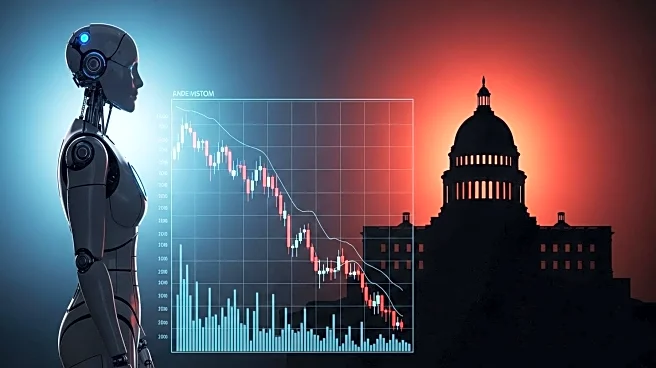What's Happening?
The U.S. stock market experienced a significant decline on October 10, 2025, with the Dow Jones Industrial Average falling by approximately 878 points, marking a 1.9% drop. The Nasdaq and S&P 500 also saw steep declines of 3.5% and 2.7%, respectively. This downturn follows record highs achieved by these indexes the previous day. The market's retreat is attributed to a combination of factors, including the ongoing U.S. federal government shutdown, which has delayed economic data releases, and heightened trade tensions between the U.S. and China. President Trump recently threatened 100% tariffs on Chinese goods, contributing to market volatility. Additionally, the AI-driven rally that had propelled tech stocks to new highs is facing scrutiny, with concerns over sky-high valuations and geopolitical risks.
Why It's Important?
The decline in the U.S. stock market highlights the fragility of investor sentiment amid geopolitical and economic uncertainties. The government shutdown, now in its second week, has created a cloud of uncertainty, affecting investor confidence and leading to significant outflows from U.S. stock funds. The trade tensions between the U.S. and China further exacerbate market instability, with potential implications for global trade and economic growth. The AI-driven rally in tech stocks, while initially boosting market performance, now faces challenges due to concerns over valuations and geopolitical risks. This situation underscores the interconnectedness of political decisions, economic policies, and market dynamics, affecting a wide range of stakeholders, including investors, businesses, and policymakers.
What's Next?
The future trajectory of the U.S. stock market will likely depend on several key factors, including the resolution of the government shutdown and developments in U.S.-China trade relations. President Trump's recent conciliatory comments regarding China have provided some relief to stock futures, but the path of market recovery remains uncertain. Analysts warn that the near-term market outlook is heavily dependent on the escalation or de-escalation of trade tensions. Additionally, the Federal Reserve's upcoming meeting on October 28, 2025, where interest rate decisions will be made, could significantly impact market sentiment. Investors and policymakers will be closely monitoring these developments to gauge potential market reactions and adjust strategies accordingly.
Beyond the Headlines
The current market situation raises broader questions about the sustainability of the AI-driven rally and the implications of geopolitical tensions on global economic stability. The high valuations of tech stocks, driven by AI advancements, may face corrections if geopolitical risks persist. Moreover, the government shutdown highlights vulnerabilities in public policy and governance, affecting economic data availability and decision-making processes. These developments could lead to long-term shifts in investment strategies, with increased focus on risk management and diversification. The interplay between technology, politics, and economics will continue to shape market dynamics, influencing investor behavior and policy decisions.











